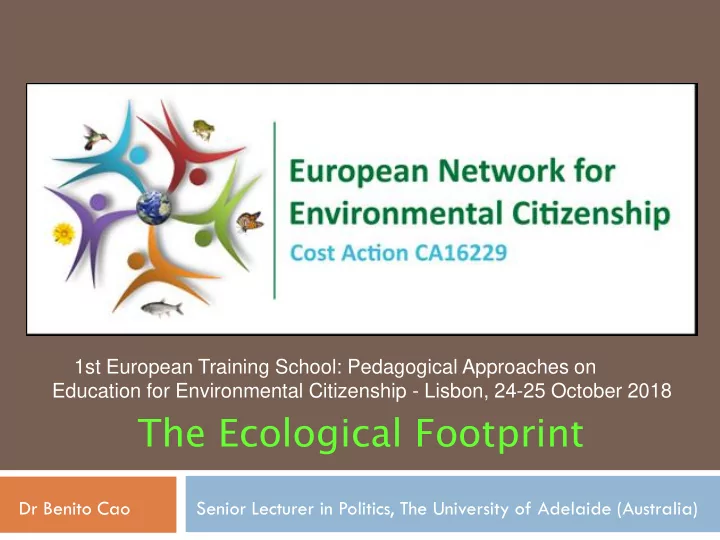

1st European Training School: Pedagogical Approaches on Education for Environmental Citizenship - Lisbon, 24-25 October 2018 The Ecological Footprint Dr Benito Cao Senior Lecturer in Politics, The University of Adelaide (Australia)
environmental citizenship
environment and citizenship The Basics: Concepts and Histories Introducing Citizenship Theories Theorizing Environmental Citizenship Environmental Citizenship in Action Governing Environmental Citizenship Environmental Citizenship Incorporated Learning Environmental Citizenship
environment: the concept The roots of the term lie in the French word environ , meaning to surround, to envelop, to enclose. In this sense, environment is synonymous with surroundings. [environment: a relational concept] but typically: environment = nature = natural env.
citizenship: the concept ‘Citizenship is a notoriously polyvalent concept, with many meanings and applications ’. (Joppke 2010: 1) Citizenship: membership of a political community** ... which comes with it a series of rights and duties. **This has come to mean membership of a state, but political communities have differed throughout history: city-state, empire, nation-state, cosmopolis. Ancient, modern, liberal, republican, national, global, legal, social, sexual, cultural, digital, neoliberal, green, environmental, ecological, sustainable …
environmental citizenship Environmental Citizenship is defined as the responsible pro- environmental behaviour of citizens who act and participate in society as agents of change in the private and public sphere , on a local, national and global scale , through individual and collective actions , in the direction of solving contemporary environmental problems , preventing the creation of new environmental problems, achieving sustainability as well as developing a healthy relationship with nature . Environmental Citizenship includes the exercise of environmental rights and duties , as well as the identification of the underlying structural causes of environmental degradation and environmental problems, the development of the willingness and the competences for critical and active engagement and civic participation to address those structural causes, acting individually and collectively within democratic means, and taking into account inter- and intra-generational justice . (European Network for Environmental Citizenship, 2018)
education for environmental citizenship Education for Environmental Citizenship is defined as the type of education which cultivates a coherent and adequate body of knowledge as well as the necessary skills , values , attitudes and competences that an environmental citizen should be equipped with in order to be able to act and participate in society as an agent of change in the private and public sphere , on a local, national and global scale , through individual and collective actions , in the direction of solving contemporary environmental problems , preventing the creation of new environmental problems, in achieving sustainability as well as developing a healthy relationship with nature. Education for Environmental Citizenship is important to empower citizens to exercise their environmental rights and duties , as well as to identify the underlying structural causes of environmental degradation and environmental problems, develop the willingness and the competences for critical and active engagement and civic participation to address those structural causes, acting individually and collectively within democratic means and taking into account the inter- and intra-generational justice . (European Network for Environmental Citizenship, 2018)
ecological interdependence Blue Marble (1972)
sustainable development The Brundtland Report (1987) sustainable development: development that meets the needs of the present without compromising the ability of future generations to meet their own needs. the concept implies that generations yet unborn have an entitlement to live in a undiminished natural environment. i.e. the rights of future citizens/humans i.e. the responsibility of present citizens inequality: global North vs global South
unsustainable consumption
differentiated responsibility
environmental education Education has always been at the heart of citizenship. Education is also central to the making of environmental citizens. How do we learn to be citizens? school: formal education media and popular culture
media and popular culture Our lives are mediated. The media influence the way we perceive and make sense of the world. This, in turn, impacts on how we act in the world. In other words, the making of citizens cannot be fully understood without adequate consideration of the role of the media in shaping the context in which we are socialized as citizens. (Cao, 2015: 223)
representations infotainment: information + television, films, cartoons entertainment: i.e. celebrities
dominant representation globalised future-oriented citizens personally responsible (consumer) citizens … but not justice -oriented problems with this representation: too much focus on consumption little space for government action no account for structural changes no space for environmental justice
school: formal education Top 10 eco education trends 1. Nature play. 2. Ecological footprint. 3. Climate Change Education. 4. Food education. 5. Service learning. 6. Green schools. 7. Integrative science. 8. Professional exchanges. 9. Learning vacations and ecotourism. 10. Spiritual environmentalism.
ecological footprint calculator
Merits/Benefits widely available quite easy to use fun, entertaining visually appealing useful tool to raise awareness about out environmental impact, particularly regarding the (un) sustainability of our individual habits and life-style in general. comparative analysis can lead to promote environmental justice
Limits/Problems does not take into account the value of political activism or other contributions to sustainability e.g. education, etc. lacks measures of equity and justice, particularly inter-generational justice individualises the responsibility; hiding the role of governments and businesses reduces citizenship to consumption sidelines collective or political action hides or obscures structural constrains
calculating lifestyle footprints
your contribution to climate change
you control climate change
environmental citizenship citizenship action: individual action (the personal is political) collective action (the political is collective) individual actions structural changes The Story of Change
Thank you!
Recommend
More recommend